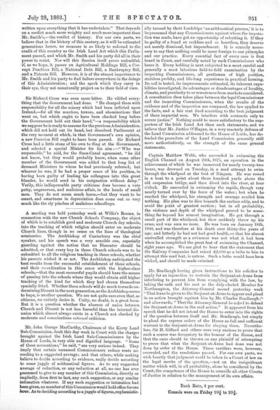Mr. Bradlaugh having given instructions to his solicitor to apply
for an injunction to restrain the Serjeant-at-Arms from interfering to prevent him from complying with the law, by taking the oath and his seat as the duly-elected Member for Northampton, the Attorney-General moved yesterday week "That leave be given to the Serjeant-at-Arms to appear and plead in an action brought against him by Mr. Charles Bradlaugh and afterwards, "That the Attorney-General be asked to defend the Serjeant-at-Arms in the said action." It appeared from his speech that he did not intend the House to enter into the rights of the question between itself and Mr. Bradlaugh, but simply to plead the express orders of the House as full and sufficient warrant to the Serjeant-at-Arms for obeying them. Neverthe- less, Sir H. Giffard and others were very anxious to prove that such a course was derogatory to the honour of the House, and that the onus should be thrown on any plaintiff of attempting to prove that what the Serjeant-at-Arms had done was not done by order of the House. These cavillers were, however, overruled, and the resolutions passed. For our own parts, we wish heartly that judgment could be taken in a Court of law on the legal merits of the question,—not on the insignificant matter which will, in all probability, alone be considered by the Court, the competence of the House to override all other Courts of Justice in relation to the management of its own affairs.


































 Previous page
Previous page